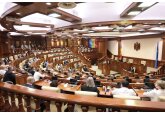
In Moldova, it is planned to adopt a law to regulate the activities of duty-free shops in accordance with international practice and to abolish some benefits.
This was announced by the deputy of parliament from PAS, chairman of the commission on economy, budget and finance Dumitru Alaiba, noting that together with his colleagues they registered the corresponding legislative initiative, prepared jointly with the Customs Service. This bill will set limits for the sale of goods in duty-free shops in the out-of-bounds area; the benefits for shops in the arrival area will be canceled in the part related to the deferred import duties; the benefit formula will be reversed by paying VAT and excise tax on imports with a refund after the sale when sales limits are verified. Dumitru Alaiba noted that this draft law is aimed at establishing a fair approach by applying taxes to goods that are sold both on the territory of Moldova and in the customs zones located at the entrance to the territory of Moldova (duty-free shops), by unifying the tax regimes applicable in tax and customs legislation. According to him, it has now been established that the same goods sold in different regimes generate unfair competition due to the exemption from VAT and excise taxes on goods sold in duty-free regime. The purpose of the bill is to ensure tax fairness for taxpayers and reduce budget losses from non-payment of taxes and fees to the budget through the existence of provisions on tax exemption for goods sold to customs control zones at the entrance to Moldova. Dumitru Alaiba noted that the provisions of the new Customs Code, which will enter into force on January 1, 2023, are in line with EU legislation, which provides for the possibility of opening duty-free shops only at airports, ports, on board aircraft and ships. Some duty-free shops in the border zone will cease their activities upon the expiration of the license, namely on December 22, 2022, that is, before the entry into force of the new Customs Code. //22.11.2021 — InfoMarket.







